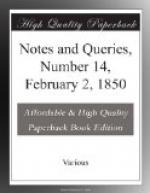is to be found in Pope’s First Epistle of the Second Book of Horace; where, however, we find that neither Censure nor Satire is the correct reading. It is moreover, both in Warton’s edition and in the Aldine Poets, edited by the Rev. A. Dyce, marked as a quotation, as will be seen in the following extract; so that Pope, it appears, is not the author of it. Perhaps some of our correspondents can trace the source from which he derived it:—
“Besides,
a fate attends on all I write,
That when i aim
at praise they say I bite.
A vile encomium
doubly ridicules;
There’s
nothing blackens like the ink of fools.
If true, a woeful
likeness; and, if lies,
‘Praise
undeserved is Scandal in disguise.’”]
Passage in Cowper’s “Task."—In all early editions of Cowper’s Task the opening lines of the 4th book are punctuated as follows:—
“Hark! ’tis the twanging horn!
O’er yonder bridge,
(That with its wearisome but needful length
Bestrides the wintry flood, in which the
moon
Sees her unwrinkled face reflected bright,)
He comes, the herald of a noisy world,”
&c.
In modern editions, I believe universally, we find the following corruption of the passage:—
“Hark! ’tis the twanging horn
o’er yonder bridge,
That with,” &c.
closing with a colon or period at “bright,” and {223} beginning a new sentence with “He comes;” and thus making the poet use the vulgar colloquialism “’tis the horn over the bridge,” instead of the remark, that the postman is coming over it.
W.P.P.
* * * * *
NOTES ON BOOKS, SALES, CATALOGUES, ETC.
All who have placed on their shelves—and who that desires to know thoroughly the history of this country during the period which it illustrates has not done so—the last edition of The Diary and Correspondence of Samuel Pepys, so ably edited by Lord Braybrooke, have felt the want of a corresponding edition of Evelyn’s Diary. To meet this want, Mr. Coulburn has announced a new edition of it, “rendered as complete as possible by a careful revision,” and accompanied by illustrative notes, to be completed in four monthly volumes.
Mr. Parker, of Oxford, has just issued a new edition of The History of the Church of England, by J.B.S. Carwithen, B.D. This work was very highly spoken of, at the time of its first appearance, for fidelity of narrative, accuracy of judgement, and soundness of principle; and its author was pronounced, by one well qualified to give an opinion, “a well-read historian, a sound divine, a charitable Christian.” As the original edition, in three volumes, has long been out of print, we think Mr. Parker has shown great judgment in bringing it out, in a cheaper form, for the use of students in divinity; and we do not doubt but that he will find a ready sale for the two closely but clearly and handsomely printed volumes, in which this History of the Church of England is now completed.




